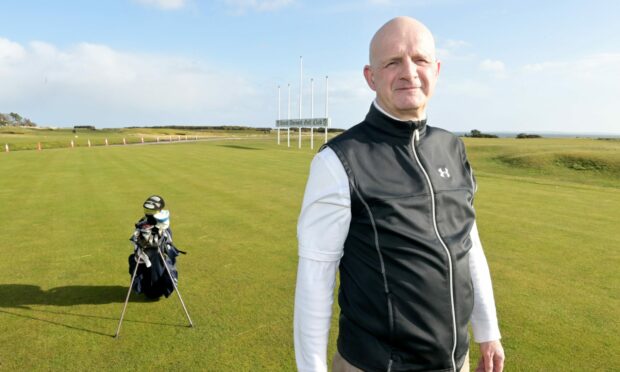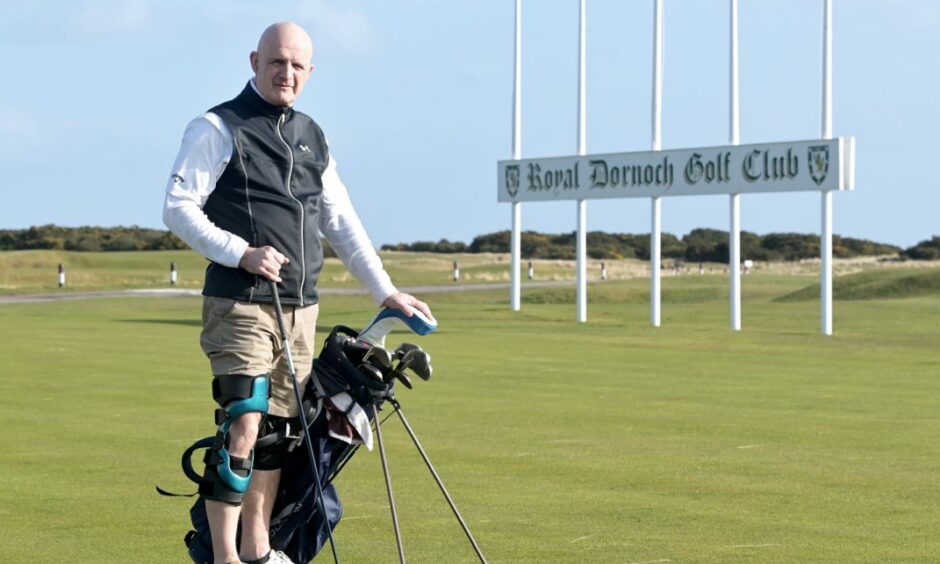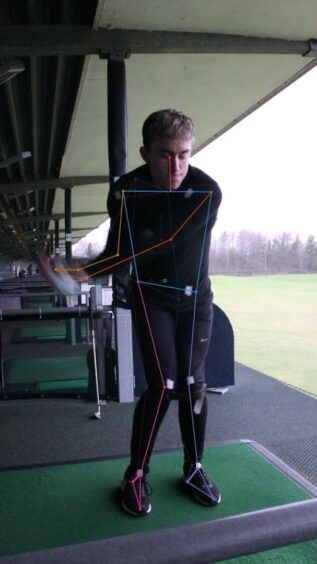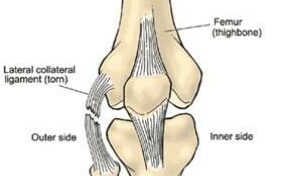Alan Mcleod’s determination to get back on the golf course after injury could tee up a solution for others in a similar position.
Alan had to stop playing due to the intense pain from a knee injury, but did not abandon hope of picking up the clubs again.
During lockdown he got an idea for a new type of knee brace to allow him, and countless others, play pain free.
Prototype in development
A prototype of the invention is now being developed with the prospect of it being made commercially available soon.
Alan, 55, from Brora, suffered a snapped lateral collateral and ruptured cruciate in 1999 while playing rugby.
His knee was rebuilt by surgeon David Finlayson at Raigmore Hospital, but Alan has not been able to play contact sport since.
It also meant the Royal Dornoch member suffered “unbearable pain” while playing golf and eventually he gave up around three years ago.
“I got very frustrated that I wasn’t able to play and it was affecting my mental health”, said Alan.
“Then during lockdown I was reading about how important golf had become for lots of people.
“There was also evidence that an increasing number of older people were getting down in the dumps after being told they were getting replacement hips or knees, only for their operations to be cancelled.
“I thought there must be some way of building something that could help people get back on the golf course if their knees, in particular, were a problem.”
He experimented with different stances and swings using knee braces until one day he tried something “bizarre” and found it worked.
The inspiration came from his rugby days.
How would the knee brace work?
Recalling having an injured finger strapped to another when a ball was not caught properly, Alan wondered if something similar could work with knees.
His design features two knee braces with powered magnets on the inside medial ligament.
The braces also have a configuration of diagonal straps on the front which effectively replicates cruciate ligaments.
At the intersection of the cruciate straps is a binding mechanism.
When a player lines up to address the ball they move their knees so the magnets draw the braces together and lock.
The powered magnets then switch on. Players are braced in one position which means there is little twist inside the knee.
I got very frustrated that I wasn’t able to play and it was affecting my mental health.”
Alan Mcleod
“Inevitably you can’t get a full back swing or follow through. You lose in distance, but there is a big net gain as you don’t have that excruciating pain due to inward rotation and downforce to hit the ball.
“People who will use this are people like me who can’t play any more so are willing to put up with a bit of palaver to get back on the course.”
Alan, an accountant who is also a poet and singer-songwriter, was once in a band, aptly called Wounded Knee.
He wrote the song ‘Jellicoe Express’ about a First World War naval train taking sailors to and from the Grand Fleet in Scapa Flow.
It was based on the boyhood memory of Dennis MacLeod, who lived near the station, and who later commissioned the Emigrants Statue in Helmsdale.
He also devised the concept of ‘The Stamping Ground’, a musical featuring the songs of Runrig, which will be staged at Eden Court Theatre this summer.
The development of the knee brace could provide a new career move.
A prototype is being developed by students at the University of Strathclyde’s engineering faculty in the department of design, manufacturing and engineering management.
‘Less that the cost of a driver’
It could be ready in a matter of weeks and, if trials are successful, production could begin next year.
Alan believes they could cost less than £200.
He said: “That’s less than the cost of a driver. If someone is not able to play any more due to injury I’m sure they will happily pay that to get back on the course.
“Being able to make these in the north of Scotland would be a dream.”
As part of its wider work on Alan’s knee brace, the university is undertaking research into the effects of joint injuries and joint pain on golf.
“Everyone has a story about injuries”, said Alan. “And everyone is interested in products that can alleviate pain from those injuries.”
Pamela Marshall, the academic supervisor for the project, said the students have also been looking at existing technology and carrying out market research to find out more about the problem and how the new product can help users.
She said: “From their investigations they have seen that people are being prevented from playing golf because they are waiting for knee operations.
“There is definitely a gap in the market. It’s getting the right product and that’s what they are working on with users.”
Neil Hampton, Royal Dornoch Golf Club general manager said: “Anything that helps people get into golf or enjoy the game more is something that must be applauded and encouraged.
“I hope that Alan can take this forward and it improves people’s lives.”



